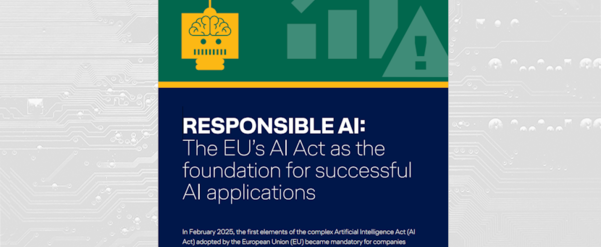It's a familiar pattern. When a new regulation comes into force, many companies initially react cautiously. This may be due to uncertainty or the fear that the bureaucratic burden could be enormous. This is once again the case with the European Union's Artificial Intelligence Act (EU AI Act) - especially among SMEs. The new whitepaper "Responsible AI: The EU AI Act as a basis for successful AI applications" shows how companies can take the brakes off artificial intelligence (AI) and use the opportunities associated with AI responsibly.
Norderstedt, May 7, 2025 - "ChatGPT has increased acceptance, but also the pressure to innovate. Many companies want to optimize their products with artificial intelligence, but also have concerns about regulation. This is unfavorable for Germany as a business location because there is already a wait-and-see attitude here when it comes to AI," says Michael Koch, Director Artificial Intelligence at Lufthansa Industry Solutions (LHIND), describing the current situation. His appeal: "We should not become world champions in AI bureaucracy, but instead develop a greater awareness of innovation with the courage to take risks."
The new LHIND whitepaper shows how companies can already successfully implement responsible AI in daily practice. For example, companies should ask themselves the following questions beforehand: What is my company's overall AI strategy? Which business units or products do I want to optimize with AI, and do I have everything I need to do so? Or can I possibly buy off-the-shelf solutions as Software as a Service (SaaS)? "If the SaaS solution is already compliant with the EU AI law, I only have to deal with the depths of the regulation to a very limited extent," says LHIND expert Koch.
"Using AI responsibly instead of blindly integrating APIs"
This thorough approach is worthwhile. After all, the EU AI law primarily brings legal certainty and standardization to companies. It complements regulations such as the GDPR and clarifies the Product Liability Directive. This makes it easier for companies to navigate the regulatory environment and offer their products with legal certainty. In this way, the EU is demonstrating how innovation and consumer interests can be reconciled. This can help increase the acceptance of AI, especially in Germany, which tends to be skeptical of technology.
How regulation can be transformed from an obstacle to a driver of innovation in artificial intelligence was also the focus of a recent panel discussion organized by LHIND for the Responsible AI Alliance. "The AI Act does not have to be a barrier to innovation, but an opportunity for competitive advantage. It calls for exactly what Responsible AI is all about: safety, responsibility and governance," said Prof. Dr. Maximilian Kiener, Head of the Institute for Ethics in Technology at TU Hamburg. "Europe's strength lies in the holistic assessment of AI - from a technological, ethical and regulatory perspective. Companies need to deal responsibly with AI anyway, instead of blindly integrating APIs." This was also emphasized by Alois Krtil, CEO of the Artificial Intelligence Center (ARIC e.V.): "The early integration of responsible AI into corporate strategy creates trust and market advantages. Companies that rely on safe and transparent AI are already better positioned today".

